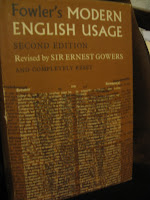In my last post I said: "Garuda these days is very different from the Garuda of days gone by". I paused when writing this. Is it "different from" or "different to"? And I have to say that after I had repeated both expressions a few times, neither sounded correct!
My usual solution in situations of this nature is to change the sentence around so as to avoid the problem. But I wasn't happy with any of the alternatives, or with the idea of wimping out. So, off to Fowler's Modern English Usage, to read: "That different can only be followed by from and not by to is a superstition" (there's a separate entry for "superstition'). And much more. The tenor seemed to be that even though "different to" was OK, it was slightly questionable territory. I was tempted to be adventurous, but in the end I played safe!
(Yes, I know that's the 2nd edition, but I cross checked with the 1st edition and it was quite similar. I don't know - and don't really care - what the 3rd edition says).
(Yes, I know that's the 2nd edition, but I cross checked with the 1st edition and it was quite similar. I don't know - and don't really care - what the 3rd edition says).


We show our educational age. The copy of Fowler on my shelf is also 2nd edition (1965). But my electronic Oxford Dictionary 2nd edition v4 (2009) also says "than" is also respectable!
ReplyDeleteSee following:
The usual construction is now with from; that with to (after unlike, dissimilar to) is found in writers of all ages, and is frequent colloquially, but is by many considered incorrect. The construction with than (after other than), is found in Fuller, Addison, Steele, De Foe, Richardson, Goldsmith, Miss Burney, Coleridge, Southey, De Quincey, Carlyle, Thackeray, Newman, Trench, and Dasent, among others: see F. Hall Mod. English iii. 82.
Surely the last word!
Different "than"? Well, to me, that just doesn't sound right. And yet the 3rd edition of Fowler mentions it? Hmmm, do I maintain my disdain for that edition, or does my curiosity get the better of me and require me to look at it?
ReplyDelete